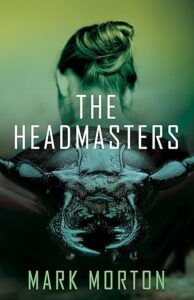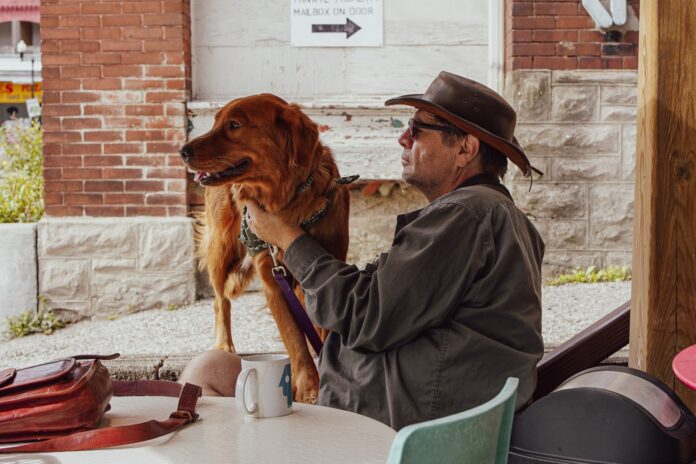Author Mark Morton shares life with pets and how they influence his writing.
On the small grain farm in Saskatchewan where I grew up, we always had dogs. For the most part, these were working dogs in the sense that they kept foxes away from our chicken coop and warned us if any of our cows snuck out of the barnyard. So they slept in our porch (the dogs, not the cows), except for when it got very cold outside (e.g., minus 40 in January—and I don’t even need to say whether that’s Celsius or Fahrenheit, because that’s the point where the two temperature systems intersect!). I loved roaming over our pasture with those dogs. And when they each got old and died, I was heartbroken.
Then I went to university. And then I kept going to university—for a total of eleven years while I did a BA, MA, and PhD. So I didn’t have dogs during those years, and I missed them. There were certainly sorrowful times when it would have been great to have a dog to snuggle up with.
After I finally started teaching at a university, I went to the humane society and got an abandoned dog: Farley, who I named after the beloved Canadian novelist Farley Mowat. Then I added another dog: Eccles, named after Eccles cakes, which were invented in the town of Eccles in the UK, which gets its name from a Greek source that means “to call out,” as in the Book of Ecclesiastes. (Forgive me: my first book was devoted to word origins!).
I got married and my wife had a dog named Nakita, which brought us up to three canines in the house. Then one night, again in the bleak midwinter—this time in Winnipeg—my wife and I were heading out to see the movie Amelie. But we didn’t make it, because on the way we saw movement in one of the ice ruts that car tires press into the thick snow on the streets. I jumped out of the car and lifted out of the ice rut a tiny, squeaking puppy. We made some efforts to find where she came from but were unsuccessful—so of course we kept her and named her Mosca (meaning “little fly”—from the same the source as “mosquito”).
Then, as if there weren’t already enough toes in our house, my wife and I adopted four older kids (seriously, if you count up toes for six humans and four dogs, that’s a lot of toes). And what did we soon discover? That one of the best things for adopted kids, especially when they’re adopted at older ages, is to have loving dogs in the house. Each of our four kids ended up “adopting” one of our four dogs.
Then Farley got old and died. And then Eccles got old and died. And then Nakita, and then Mosca. Each time, all of us were heartbroken. It seems unfair that dogs only get to live for fifteen years or so—especially when some turtles live till they’re over a hundred!
But I was able, in a sense, to resurrect Farley—as a character in my novel, The Headmasters. In that book, Farley never speaks—he’s still very much a dog—and his existence is kind of… mystical. He appears only when the main character, Maple, is in deep trouble. The first time is when Maple enters the collective mind of the alien species that’s subjugated her people. The second time is when she’s trapped on the ladder of a wind turbine that’s about to collapse. In both cases, Farley functions as a kind of spirit-animal: an enigmatic guide in the tradition of, say, Virgil in Dante’s Divine Comedy, Athena in The Odyssey, or George Carlin in Bill and Ted’s Excellent Adventure.
I found it profoundly meaningful to imagine Farley into my novel. After he died, I wrote a poem about him, too:
for farley, who died in the night at the bottom of the stairs
walking down queen street in st. marys
my sister saw a dog that looked just like you sitting
in the back seat of a car
she called me over and as i looked into the eyes so similar to your own
i realized that this was another dream of you that i
was supposed to have that night:
you in a stranger’s car, me on the street, a window halfway
down between us, one side of the street cast in shadow, the
other bright with april sun
you seemed sad but not because you missed me or because i missed you
but because we both knew that in time we wouldn’t
Now, more than ten years after writing that poem, I’ve realized its last line isn’t true: I still miss Farley—and when I’m drawing my last breaths on this Earth, hopefully decades from now, I’m certain he’ll still be among the last things I think of.
Here’s look at Mark’s latest release THE HEADMASTERS:
 How do you learn from the past if there isn’t one?
How do you learn from the past if there isn’t one?
Sixty years ago, something awful happened. Something that killed everyone except the people at Blue Ring. Something that caused the Headmasters to appear. But Maple doesn’t know what it was. Because talking about the past is forbidden.
Everyone at Blue Ring has a Headmaster. They sink their sinewy coils into your skull and control you, using your body for backbreaking toil and your mind to communicate with each other.
When someone dies, their Headmaster transfers to someone new. But so do the dead person’s memories, and if one of those memories surfaces in the new host’s mind, their brain breaks. That’s why talking about the past is forbidden.
Maple hates this world where the past can’t exist and the future promises only more suffering. And she hates the Headmasters for making it that way. But she doesn’t know how to fight them – until memories start to surface in her mind from someone who long ago came close to defeating the Headmasters.
But whose memories are they? Why aren’t they harming her? And how can she use them to defeat the Headmasters? Maple has to find the answers herself, unable to tell anyone what she’s experiencing or planning—not even Thorn, the young man she’s falling in love with.
Thorn, who has some forbidden secrets of his own . . .
Buy Links: https://books2read.com/
ABOUT THE AUTHOR:
Mark Morton, author of The Headmasters and Cupboard Love: A Dictionary of Culinary Curiosities (nominated for a Julia Child Award), is also the author of three other nonfiction titles, The End: Closing Words for a Millennium (winner of the Alexander Isbister Award for nonfiction); The Lover’s Tongue: A Merry Romp Through the Language of Love and Sex (republished in the UK as Dirty Words), and Cooking with Shakespeare. He’s also written more than 50 columns for Gastronomica: The Journal of Food and Culture (University of California Press) and has written and broadcast more than a hundred columns about language and culture for CBC Radio. Mark has a PhD in sixteenth-century literature from the University of Toronto and has taught at several universities in France and Canada. He and his wife, Melanie Cameron (also an author), have four children, three dogs, one rabbit, and no time.
For more information on Mark and his books:






